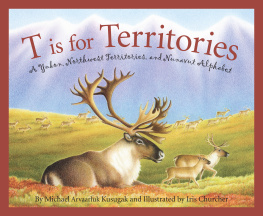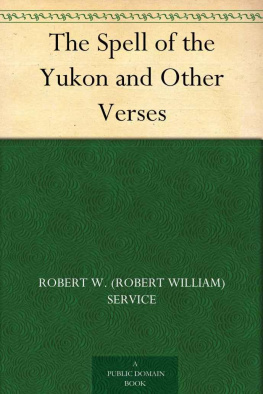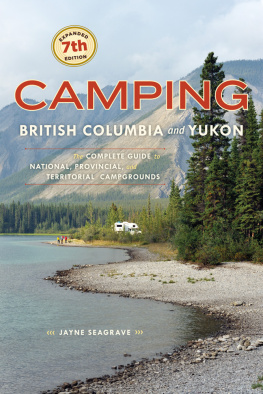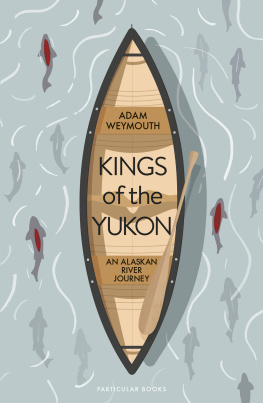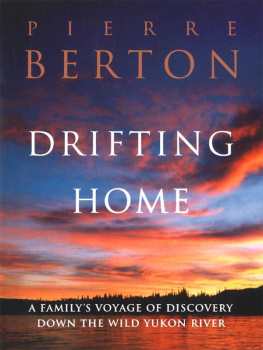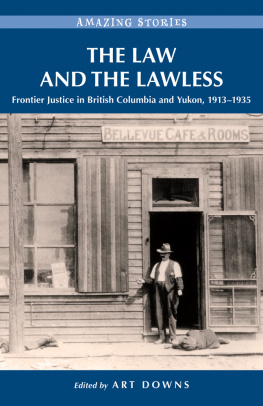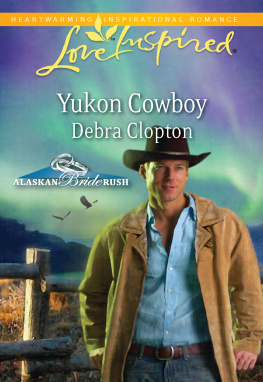Adam Weymouth - Kings of the Yukon
Here you can read online Adam Weymouth - Kings of the Yukon full text of the book (entire story) in english for free. Download pdf and epub, get meaning, cover and reviews about this ebook. year: 2018, publisher: Little, Brown and Company, genre: Detective and thriller. Description of the work, (preface) as well as reviews are available. Best literature library LitArk.com created for fans of good reading and offers a wide selection of genres:
Romance novel
Science fiction
Adventure
Detective
Science
History
Home and family
Prose
Art
Politics
Computer
Non-fiction
Religion
Business
Children
Humor
Choose a favorite category and find really read worthwhile books. Enjoy immersion in the world of imagination, feel the emotions of the characters or learn something new for yourself, make an fascinating discovery.

- Book:Kings of the Yukon
- Author:
- Publisher:Little, Brown and Company
- Genre:
- Year:2018
- Rating:4 / 5
- Favourites:Add to favourites
- Your mark:
- 80
- 1
- 2
- 3
- 4
- 5
Kings of the Yukon: summary, description and annotation
We offer to read an annotation, description, summary or preface (depends on what the author of the book "Kings of the Yukon" wrote himself). If you haven't found the necessary information about the book — write in the comments, we will try to find it.
Kings of the Yukon — read online for free the complete book (whole text) full work
Below is the text of the book, divided by pages. System saving the place of the last page read, allows you to conveniently read the book "Kings of the Yukon" online for free, without having to search again every time where you left off. Put a bookmark, and you can go to the page where you finished reading at any time.
Font size:
Interval:
Bookmark:
Copyright 2018 by Adam Weymouth
Illustrations copyright 2018 by Ulli Mattsson
Hachette Book Group supports the right to free expression and the value of copyright. The purpose of copyright is to encourage writers and artists to produce the creative works that enrich our culture.
The scanning, uploading, and distribution of this book without permission is a theft of the authors intellectual property. If you would like permission to use material from the book (other than for review purposes), please contact permissions@hbgusa.com. Thank you for your support of the authors rights.
Little, Brown and Company
Hachette Book Group
1290 Avenue of the Americas, New York NY 10104
littlebrown.com
twitter.com/littlebrown
facebook.com/littlebrownandcompany
First ebook edition: May 2018
Little, Brown and Company is a division of Hachette Book Group, Inc. The Little, Brown name and logo are trademarks of Hachette Book Group, Inc.
The publisher is not responsible for websites (or their content) that are not owned by the publisher.
The Hachette Speakers Bureau provides a wide range of authors for speaking events. To find out more, go to hachettespeakersbureau.com or call (866) 376-6591.
ISBN 978-0-316-39668-4
E3-20180420-JV-PC
To you, as yet unnamed, who came along quicker than this book
And to Mum and Dad, for always trusting that I knew what I was doing
the generations that came before, the generations coming after
Wait, I see something: We come upstream in red canoes.
Riddle of the Alaskan Athabascans, documented by the missionary
Julius Jette (18641927)
rival (n.)
from the Latin rivalis , one person using the same stream as another
There are five species of salmon found in Alaska and Western Canada. This book is concerned predominantly with one of them, Oncorhynchus tshawytscha , generally referred to as the king in Alaska and the Chinook in Canada. I have used both these names interchangeably throughout.
While the majority of the research for Kings of the Yukon was carried out during the summer of 2016, I returned to the Canadian side of the border for a shorter trip in 2017. One summer in the North is simply too short a season to cover the two thousand miles of river that the salmon span between break-up and freeze-up. I have, however, written about the trip as one continuous journey, in order to preserve the flow of the story. All data on escapement numbers, sex ratios, etc., relates to the 2016 season. Most interviews were recorded by hand, either at the time or afterward; several were recorded on audio. Some characters names have been changed to protect their privacy. Interviews in Canada were carried out according to the Traditional Knowledge policies of the First Nations involved, policies which strive to protect their cultural heritage from exploitation.
The terms Eskimo and Indian are often considered pejorative, yet are commonly in use in Alaska and Canada, among both indigenous and white people. Alaskan Native and First Nation are not able to differentiate between these two distinct groups, and they do not encompass the connection, on the Eskimo side, between other groups that inhabit the circumpolar region, and on the Indian side, with other native peoples of Canada and the Lower 48. As such I have occasionally used them in the book, alongside the proper names of specific tribes and clans. While the word Indian is commonly assumed to derive from Columbus believing that he had reached India, figures such as the activist Russell Means and the American Indian Movement offer an alternative etymology, described here by Cree lawyer Harold R. Johnson in his book Firewater : Columbus was not lost, he knew where he was, and he called us In Dios , meaning with God. The word is not as important as the story we tell about it. Indian is also a precise legal term found in our Treaties and the Canadian constitution.
Finally, for reasons best known to themselves, Alaskans call a snowmobile a snowmachine. A snowmachine is not for making snow, as it is everywhere else, but for driving on it. It is the word I have used in this book.
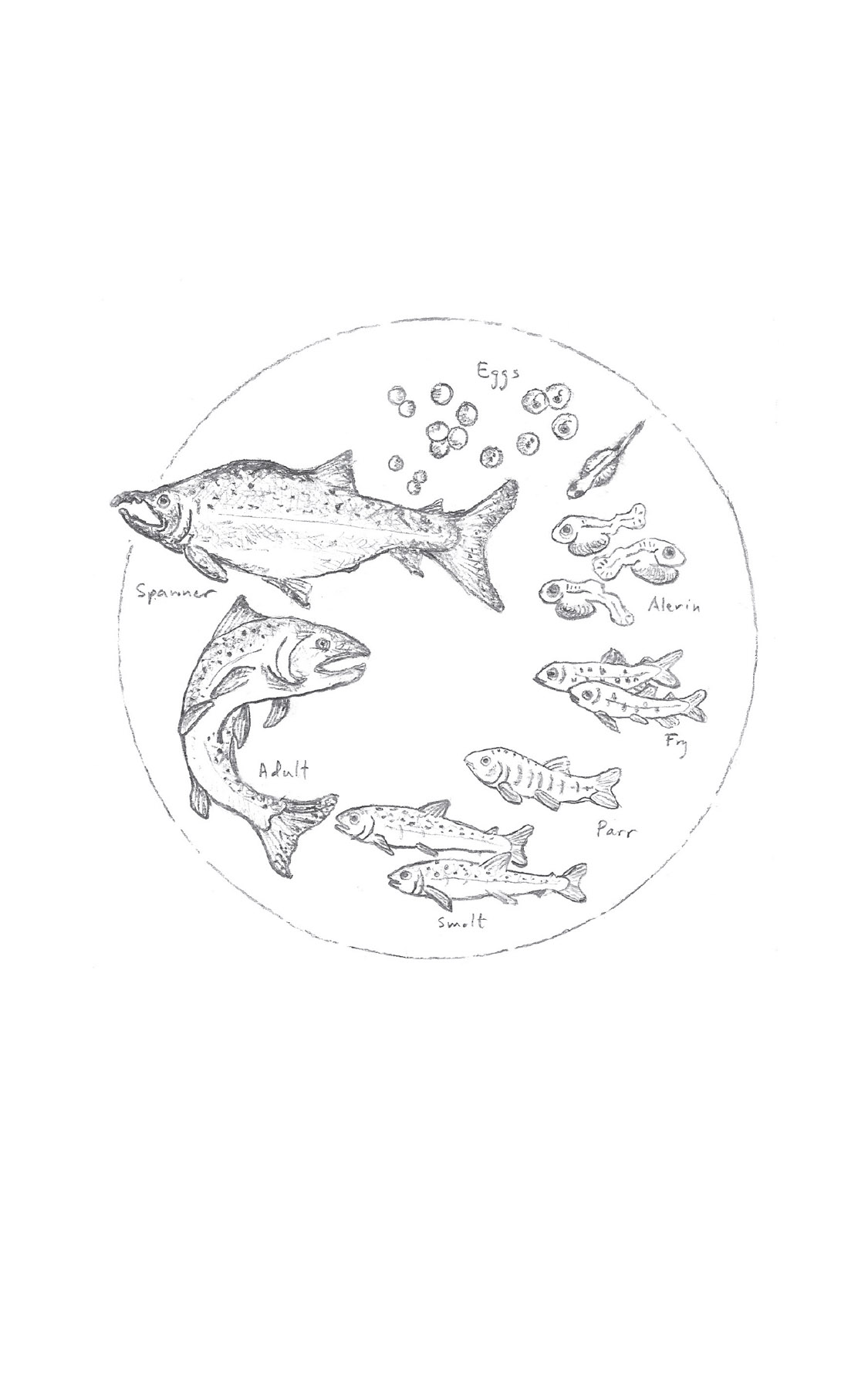
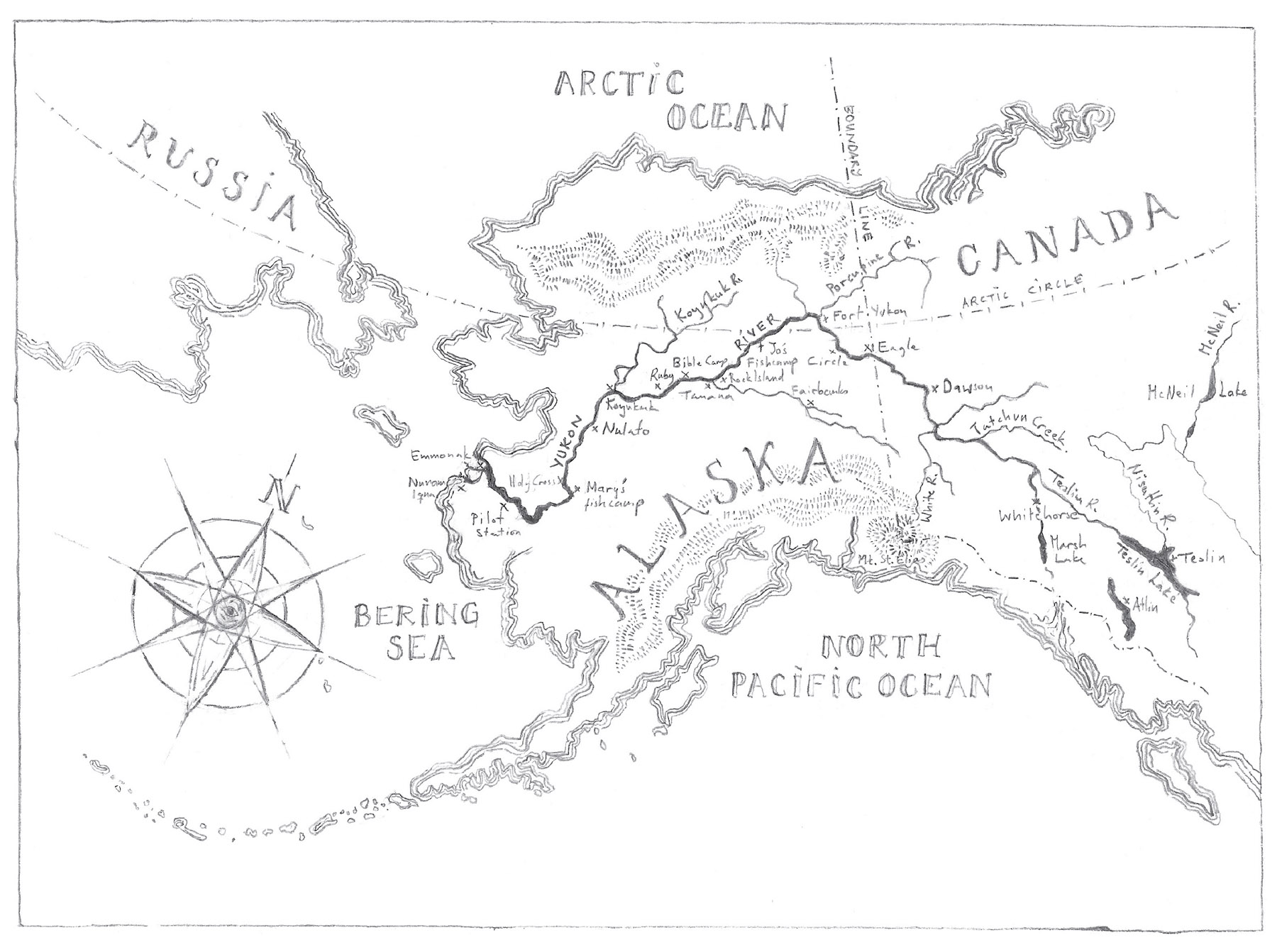
The river is flowing backward, back up from the sea.
They swim through silt, eyes wide, unblinking. Thirty, forty, fifty pounds of flesh, many thousands of them. Their backs speckled like frogspawn, the blush of their bellies, where the silver of their flanks fades into a deep and meaty rose. Jaws gawping, lips beginning to curve in upon themselves like pliers, propping their mouths ajar so that the river flows right through them, and yet for the rest of their lives these salmon will not eat, they will not drink. The organs that sustain them, the kidneys and the stomach, are shrinking as they sense the sweet water they have not known since they were smolts, finger big, years back. Familiar scents long forgotten are triggering changes in their brains and in their bodies: their chemistry has new priorities now. The ovaries of the female hen will swell to a sixth of her bodyweight during her swim upriver, the cocks testes will increase fivefold.
For several years the salmon have roamed in schools throughout the Bering Sea, the chain of the Aleutians, the Sea of Okhotsk, ranging as far as the coasts of Japan. Their many species mingle. They travel farther than science can reach, and much of what they eat and where they winter can only be surmised. The Yupik say that they live in human form beneath the waves, five houses, one for each tribe, and at the salmon kings behest, each spring, they pull on their fins and silver skins and make for the human world. In the late Arctic spring, impelled before the others, the kings turn for North Americas west coast. California, Oregon, Washington, British Columbia, Alaska. They have iron in their brains, their compasses have led them here; now they scent their birthing pools. A chemical mix of vegetable and mineral unique to the waters of their birth that draws them on a thread up several thousand miles of river. They can distinguish a single drop from their home river among two million gallons of seawater.
The movement of one, changing direction, pulses through the rest, electric. At times they crest the surface, a dark sleek back, a dorsal fin, undulating like dolphins. These fish are many pounds of muscle, toned through years of swimming headlong into Pacific storms, and their flesh is red as blood. They force against the Yukons current, shouldering their way upriver, tacking crosswise through the flow, setting their fins like sails. Their shadows pass like clouds across the bottom. They rest in the eddies of boulders on the rivers bed, erratics left behind by glaciers. At the rivers mouth the water is still brackish, the current compounded with the flow of the tide. But it is diluting, and as they move farther up the delta the sea slackens off its hold, resigning, letting them go. On this great in-breath of the land the kings spread up through the waters and their tributaries, permeating the watershed. Eventually, they will push thousands of miles into the continents interior. They will reach mountain lakes, they will reach the clouds.
It is the end of May, and spring is late. Which is not to say that it is a late spring, because this far north there is no such thing as a yardstick to measure the seasons up against (Ive been here fifty years, in the words of one old-timer, and the only normal year we had was two years ago), but people say it is not where it ought to be. Mountains ring the town, and the snow still comes far down their peaks. The dandelions only opened last week. Bears have awoken from hibernation and, finding nothing to eat, have roamed within the Whitehorse city limits, sniffing out trashcans and chicken coops. The government has shot six in the past month.
Font size:
Interval:
Bookmark:
Similar books «Kings of the Yukon»
Look at similar books to Kings of the Yukon. We have selected literature similar in name and meaning in the hope of providing readers with more options to find new, interesting, not yet read works.
Discussion, reviews of the book Kings of the Yukon and just readers' own opinions. Leave your comments, write what you think about the work, its meaning or the main characters. Specify what exactly you liked and what you didn't like, and why you think so.

